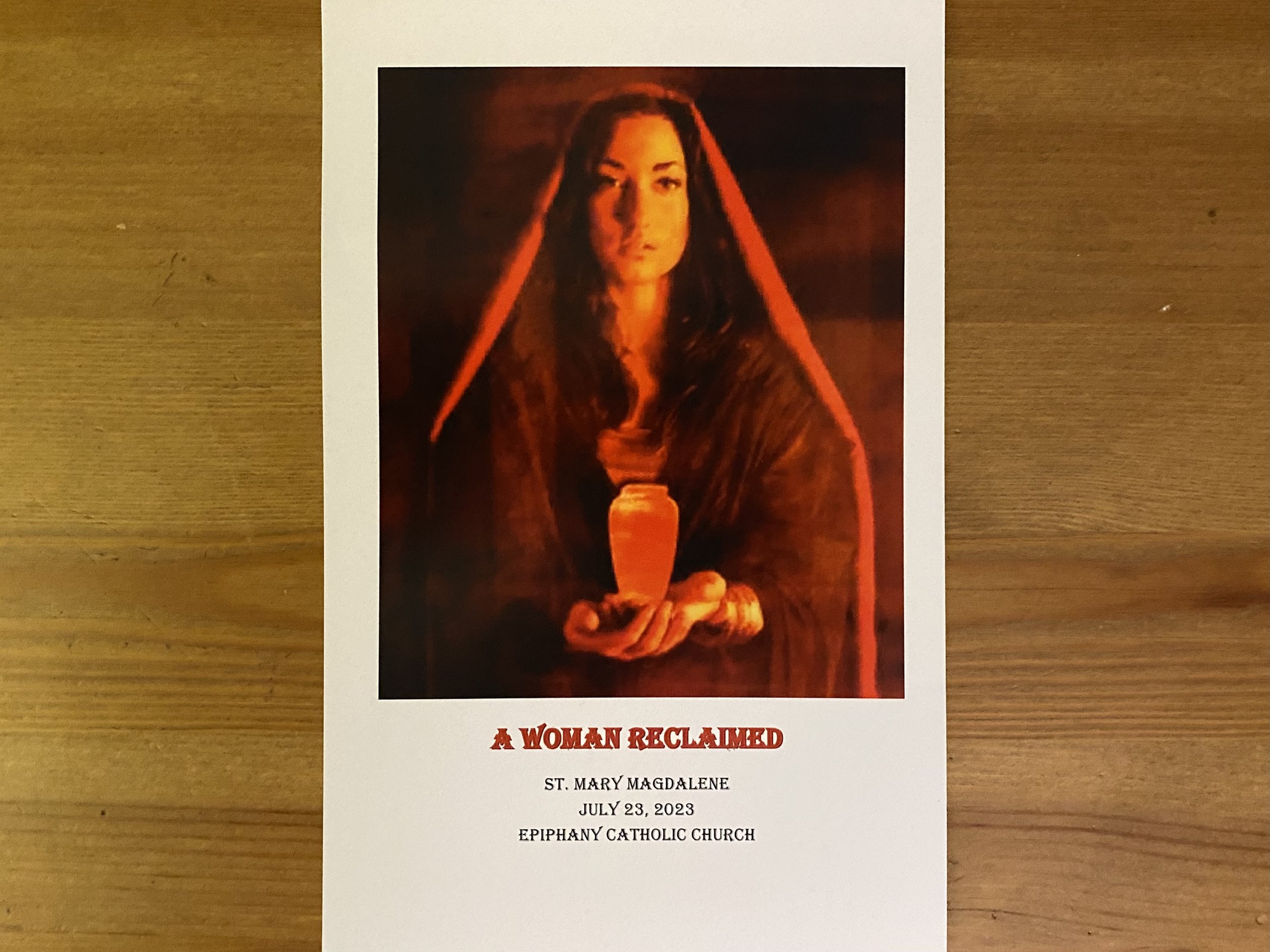Mary Magdalene: A Woman Reclaimed, Reflection for her Feast Day
/I had the great honor of sharing these reflections at Epiphany Catholic Church on July 23, 2023 for their Feast of Mary Magdalene celebration (her actual feast day is July 22).
Feast Day of Mary Magdalene; Epiphany Catholic Church, Joan Chittister excerpt, A Passion for Life; Luke 24:1-12
Good evening. What a joy it is to be with you all celebrating the Feast of Mary Magdalene.
Yesterday the Resonant Peaceful Cities Project began for the 2nd of 3 years in Louisville. This study measures the effect of synchronized meditation on violence in a city or area of a city; this year the focus area is in Old Louisville. Last year with the participation of a few hundred ordinary folks like you and me, there was a 13% reduction in violent crime in Louisville during the time of the study. This year there are at least three times more people participating and it is expected that there will be a greater reduction in violence in Louisville, and particularly in the focus area, during the study period.
A few weeks ago I was telling a scientist about the project and last year’s results. The best way I can describe his response is that it was filled with contempt and derision. I won’t go into the particulars of his objections, but I will say that it was disappointing that a scientist, who I’d hope would exercise a healthy curiosity, was unwilling to even look at the data because it didn’t fit his preconceived ideas.
We just heard in Luke’s gospel that when Mary Magdalene, Joanna, and Mary told the male apostles of Jesus’ resurrection, the men did not believe them. I wonder if the male apostles’ responses were also filled with contempt and derision. I hope not. If I put myself in their shoes, it’s easier to give them the benefit of the doubt because I can imagine being hesitant to believe. Maybe I’d be like Peter, wanting to check things out myself.
I also imagine myself in Mary Magdalene’s shoes. I’m grieving my friend’s death, expecting to see and anoint his body, and he’s gone. I’m unsettled by that and even more so by the appearance of the two men in gleaming white who tell me Jesus is risen. Even though Jesus had told us it was going to happen, it’s pretty discombobulating to actually experience it. When I go to tell the others, I’m trying to process what’s just happened and I really need some care and understanding. Not only do I not get care and understanding, I’m met with disbelief.
How was that for Mary? Was she expecting that reaction from her friends? Did the experience feel familiar? I wonder how many other times, even as a part of Jesus’ inner circle, Mary had spoken up among the men and been ignored, silenced, or told she was wrong. I am thankful that, whatever her previous experience, she chose to use her voice, to claim and proclaim what she had witnessed.
If you are a woman, I suspect speaking up and not being listened to is familiar. I suspect that speaking and not being taken into account until a man repeats what you’ve said is also familiar. Mary told the male apostles, but it was the men who spread the word wider.
Two thousand years later we women still have the experience of speaking truth and not being believed. We have the experience of stepping into leadership, whether in the church, the business world or in other contexts, and only being able to get so far.
In 2016 Pope Francis raised the celebration of Mary Magdalene from a memorial to a feast day. He recognized her as “the apostle to the apostles,” and noted that, “The decision is situated in the current ecclesial context, which calls upon us to reflect more deeply on the dignity of women, the new evangelisation and the greatness of the mystery of divine mercy.”
We can celebrate this recognition, this reclamation of Mary Magdalene’s importance in our Catholic heritage. But, I, like Joan Chittister, am frustrated that “it is two thousand years later and little or nothing has changed.”
I am frustrated that there is a need to “reflect more deeply on the dignity of women.” We are all made in the image and likeness of God; this alone endows us with inherent dignity. When I was teaching theology at Trinity, I remember talking about women’s experiences and women’s rights to my students. In their reflections, more than one of my students wrote, “I now realize that women are people, too.” I am frustrated that somehow the humanity of women is still in question.
As I was writing this, I considered whether I’ve heard men referred to as less than human. I have, in the context of men who do harm to others, and in the context of men who are part of the global majority – black, brown, indigenous – or part of some other marginalized group. But in a general sense, I don’t hear men’s humanity and dignity questioned.
I am frustrated that women’s wisdom and leadership is nearly always absent from the pulpit. I am frustrated that we’re told that we are equal to men in the church, but that we cannot be deacons or priests. I also grieve this, since I know women who feel called to minister in this way and cannot follow that call in the Catholic Church. I am frustrated that someone like Roy Bourgeois, who supports women priests in this institution can be laicized and excommunicated for his solidarity and advocacy. I am frustrated that the many ways women weave our church communities together are often overlooked, taken for granted, or minimized.
Mary Magdalene was named twelve times in the gospels, second only to Jesus’ mother Mary. Mary Magdalene is one of the few followers who was explicitly named as witness to Jesus’ death and burial. She did not shy away from what must have been the gut-wrenching grief of watching her beloved friend die a horrible death. She was present at his burial and she was prepared to do the sacred work of anointing his lifeless, brutalized body.
Mary Magdalene, who was healed by Jesus and faithfully followed and supported him, was strong. She is, as Joan Chittister says, an icon for our century.
Chittister says, “She calls women to listen to the call of the Christ over the call of the church.” In a church that speaks of honoring women, but not does not, in fact, fully embrace us, we instead heed the call of the universal Christ, the spirit of all-embracing love. Dear women, this Christ of wholeness and interconnection lives in each of us. Mary Magdalene calls on us to trust ourselves.
Chittister says, “She calls men to listen for the call of the Christ in the messages of women.” Patriarchy hurts us all. In the patriarchal paradigm, men are expected to have all the answers and lead with certainty, even when they are not certain and lack information, like the scientist who wouldn’t look at the data that challenged what he thought he knew. When men don’t listen to women, it is to the detriment of women and men. Dear men, we women are half of the global population. Our words, our experiences, our gifts, our truths do not diminish the value of your words, your experiences, your gifts, your truths. In fact, we enrich each other when we share them. When you, when we, bring curiosity and a sense of wonder to all people’s realities, when we honor both our commonalities and our uniqueness, we piece our fragmented world back into holy wholeness. Mary Magdalene calls on men to trust women.
Chittister says, “Mary Magdalene is a shining light of hope, a disciple of Christ, a model of the wholeness of life, in a world whose name is despair and in a church whose vision is yet, still, even now, partial.”
We celebrate Mary Magdalene today in our world whose name is despair and our church whose vision is still partial. As we do so, we reflect upon her legacy and her lessons.
The theme of tonight’s celebration is “A Woman Reclaimed.” Reclaiming is often preceded by letting go of something to make space for what we choose to claim again. In that spirit, I offer these questions first for quiet reflection and then sharing.
Chittister says, “[Mary Magdalene] calls women to courage and men to humility.”
For women: When have you practiced courage? What would you like to release and reclaim to practice humble courage now?
For men: When have you practiced humility? What would you like to release and reclaim to practice courageous humility now?
If those questions don’t resonate for you, I offer this simple question: How do this evening’s readings and reflection touch you?




